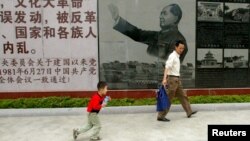BEIJING —
Almost 40 years after the death of Mao Zedong ended the Cultural Revolution in China, some aging survivors are ending decades of silence and going public about their actions.
Mao remains a political icon in China, largely immune from public criticism. But in recent years more Chinese have been publicly recounting the horrors of his Cultural Revolution through memoirs, interviews and public apologies.
Notably, some of those accounts have been published in Chinese media, a sign of an increased willingness to revisit painful memories that are still very much alive for both victims and their tormentors.
From student to teacher
One of the first such accounts was an apology from a student to a teacher that was published in Chinese media in 2010.
Chen Bi is a 90-year-old retired teacher who worked at Beijing Foreign Language School.
In August 1966, during the first peak of violence of the Cultural Revolution, she was targeted by students who had been encouraged by Mao’s speeches to antagonize teachers, intellectuals, parents and other authority figures.
“For those of us who were persecuted it was a nightmare,” she recalled.
Shen Xiaoke, 17, was a student at Chen Bi's school when classes were suspended and intense political indoctrination began.
“Students would compare between themselves who was more revolutionary," Shen explained. "If you did not hit others then you would be considered a rightist. So some people who normally would not dare hit others, they also would raise their hands and hit."
At public meetings, Shen saw many of his classmates denounce and criticize teachers deemed counter-revolutionary. The persecution was so intense two school managers committed suicide. Shen now says everyone targeted was in fact innocent.
“They were all good people, but they got tortured to the extreme, they suffered beatings, abuses and humiliation," he said. "Although I never hit them, I have always felt distressed by what happened to them.”
In 2010, Shen decided to face his troubling memories, and wrote Chen Bi an apology letter on his and other classmates’ behalf.
“It [what happened to her] was a mistake, and as a mistake, I think we needed to apologize to our teachers,” he admitted.
‘Red Guards’ seek atonement
Since then, other former student leaders known as “Red Guards” have come forward expressing remorse.
On a rare talk show program about the Cultural Revolution, broadcast earlier this year by Hong Kong TV channel Phoenix, Zhang Hongbing told his story and asked for forgiveness.
In 1970, as a radicalized red guard, he denounced his own mother for using insulting language at home while talking about Mao Zedong.
As Zhang stood looking, police beat and arrested his mother. After a few months she was executed as a counter revolutionary.
In another case, Li Bin, who worked as an art director at a red guard publication, told the magazine Southern Weekly that he too felt responsible for the mayhem brought about by the Cultural Revolution.
“I drew so many revolutionary pictures, I acted as a machine propagandizing violence,” he said.
Wang Youqin, a lecturer at the University of Chicago, has been documenting the crimes committed during the Cultural Revolution and talked with hundreds of eyewitnesses to the violence.
She said that despite the trauma of remembering scenes of extreme cruelty, the people she interviewed wanted their stories to be recorded, so that history would not repeat itself.
“Chinese people always say that history is like a mirror,” she noted “If we can see ourselves in the mirror, then we can correct ourselves.”
Although more people are openly discussing their personal experiences, the government has shown little interest in revisiting the period.
A highly public trial after Mao's death shifted all the blame on the gang of four - which included Mao's wife and other radicals - and pronounced the Cultural Revolution a mistake. In the early 1980s Deng Xiaoping offered his appraisal of Mao's rule, and famously said the leader had been 70 percent right and 30 percent wrong.
More recently, party leaders have avoided the subject, in part because criticism of Mao or his tenure could threaten the legitimacy of the Communist Party.
Cultural Revolution largely remains off limits
Although Chinese media have published some personal stories from the Cultural Revolution, broader examinations of the period remain largely off limits.
Professor Wang Youqin's website where she has been posting interviews with victims and related documents collected over the years, is blocked in China.
In April, a former Red Guard called Wang Keming finished editing a collection of essays written by 32 fellow red guards titled “We confess.”
Wang recently told media that attempts to publish the collection failed, with publishers telling him: “This is not the time yet” for such accounts."





